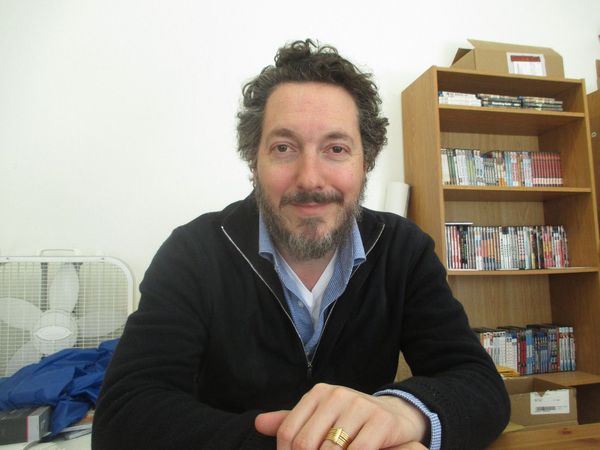 |
| Guillaume Gallienne: "The script had all the elements, the love and trust of Danièle." Photo: Anne-Katrin Titze |
Danièle Thompson's Cézanne Et Moi, starring Guillaume Gallienne as Paul Cézanne and Guillaume Canet as Émile Zola, had its New York premiere on Wednesday, hosted by Diane von Furstenberg and Barry Diller at The Whitby Hotel, where I had spoken to Wilson director Craig Johnson, screenwriter Daniel Clowes, Woody Harrelson, Laura Dern, Judy Greer and Isabella Amara.
The women in Cézanne's life were his mother Anne-Elisabeth (Sabine Azéma) and wife Hortense (Déborah François also in Claude Lelouch's latest Chacun sa vie). For Zola, his mother Émilie (Isabelle Candelier), wife Alexandrine (Alice Pol -Lelouch's Un + une), and mistress Jeanne (Freya Mavor). Guillaume Gallienne, who played Pierre Bergé in Jalil Lespert's Yves Saint Laurent gave some clarity into his vision of Cézanne, his relationship to Zola, and the women around them.
_225.jpg) |
| Déborah François plays Cézanne's wife Hortense Photo: Anne-Katrin Titze |
In Cézanne Et Moi, Sabine Azéma's face, when she contemplates the clock in the painting done by her son brought to her by Zola, is transparent, as though we could gaze straight into the agony of her soul. It is an expression of pity, protectiveness, resignation. I love you anyway, my boy, despite your painting and the rejection of the comfortable bourgeois life that could have been yours, she seems to say with her eyes.
Nobody understands what Cézanne is doing as he struggles to reach his own artistic goal. We see him overhear his "friends" gossiping, he has to read a very unflattering, suicidal portrait of himself in Zola's novel The Masterpiece (L'Œuvre). When François Ozon in Frantz tells of his two male leads spending a day in the Louvre, looking at paintings, you can imagine what they might have had to say to each other. Cézanne and Zola and their colleagues here squabble over their positions and fate in life.
Women in Cézanne Et Moi do verbally complain and stick around anyway. A muse is a muse and maybe there was nowhere else for them to go either. Thompson does not focus on them. It is the two world-famous guys she tries to pin down like butterflies, as if she were a lepidopterist. They escape, of course, because their works are still alive.
_225.jpg) |
| Paul Cézanne with Émile Zola: "I, for example, didn't know that they had been best friends for 35 years, those two geniuses." |
Anne-Katrin Titze: Pierre Bergé in a documentary [Pierre Thoretton's L'Amour Fou] said something along the lines that objects don't belong to us but we belong to the objects for a while. The objects remain, people fade. Because you played Bergé, why not start that way with Cézanne. What remains are the paintings. The person is not very well known.
Guillaume Gallienne: People don't know much. Specialists know quite a lot about him because he wrote many letters and a lot of people wrote letters about him. We got quite strong information about the bloke. The public doesn't know much. I, for example, didn't know that they had been best friends for 35 years, those two geniuses. What remains is their work and the fact that one is the father of Naturalism and the other is the father of Cubism - that we know.
I didn't know anything about their friendship, nor did Danièle [Thompson] a few years ago. How did they remain friends for so long and what happened that made them break up? That's what I loved in the script - instead of doing a cross-biopic of those geniuses in a chronological way, it was more the story of that friendship. We didn't have to play those geniuses in a way. We had to play…
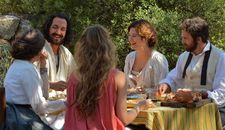 |
| Paul Cézanne and Émile Zola with Zola's wife Alexandrine (Alice Pol) |
AKT: …a friendship.
GG: And the frustration. One becomes a bourgeois and a recognised genius and the other one becomes a tramp and no one recognises his work. And worst of all, his best friend doesn't appreciate his work.
AKT: The person you play in this film is attacked nonstop. In the most interesting, different ways. Sometimes it's overhearing what somebody says and sometimes it's to your face.
GG: Or sometimes it's in a book.
AKT: Before the days of Twitter, it's a bombardment of criticism.
GG: Yeah. I worked for six months preparing the part with a makeup artist. But also with a painter called Gérard Traquandi from Marseille, a friend of Danièle's she introduced me to. I worked with him quite a lot not only with the brushes and the way Cézanne was holding his brushes and painting but also looking at his work and the evolution of his work.
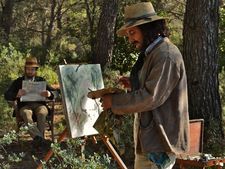 |
| "What's fascinating about Cézanne is that you feel he knows exactly what he wants to do, but the frustration is that he can't do it." |
What's fascinating about Cézanne is that you feel he knows exactly what he wants to do, but the frustration is that he can't do it. It's really only in the last ten years that he achieved the way he wanted to do it. It was a struggle and probably the only obsession of his life. The rest is, yeah, yeah, yeah, you can talk about me but I know I'm right!
AKT: That's why he could destroy his work.
GG: He destroyed two thirds of his work, yeah.
AKT: Because you have to be really full of yourself to do that, in a way. Without that conviction…
GG: You know, also he only worked in a chromatic way. The only interest was the shape, the geometry and the colours. His obsession was going from blue to yellow and all the different colours. He couldn't care less about the subject. It wasn't an apple anymore, it was just red, yellow with blue. He was the only one interested in what was happening between two colours. How do you get there?
AKT: Is there an equivalent in acting?
GG: Yes, definitely. I love that.
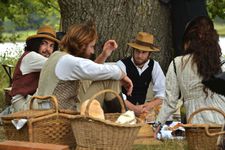 |
| Paul Cézanne and Émile Zola at the picnic by the river |
AKT: Going from one colour to the other?
GG: And that's exactly what I did with Cézanne. Because I knew in the script I have those colours. There you can see strength and him sweating, trying to find the right spot and the right colour and light. When he reads the letter and you can see him walking in the mountains and struggling and destroying the canvas. So this I have there. There I have the humiliation.
He humiliates the woman, his wife. And then he plays a trick with Alexandrine, then it's with the mother. So these colours and these colours - how do I go from one colour to another? Do I go from one colour to another or do I leave a contrast? In a way, the big struggle was, how can I be a touching pain in the ass? The script had all the elements, the love and trust of Danièle. Also with Guillaume [Canet], I've known him since the age of 19. The tenderness is here, the obviousness is here - now how are we going to work?
AKT: The big emotional fights - some actors hate doing them, some love them. Are there types of scenes you find particularly difficult?
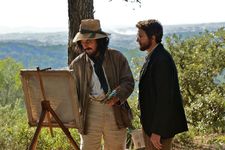 |
| Guillaume Gallienne on liking difficulty in scenes: "I'm always very suspicious of easiness." |
GG: I'm always very suspicious of easiness. When it looks easy, I go -Danger! Very often I have a makeup artist I adore because very often we change the makeup. It's what is it today? It's the present.
AKT: It's also interesting that the two men - you have this conversation - concerned about their looks. One of them gaining weight, the other one loosing his hair. In a lot of films you might have a discussion like that between women but not often between two world-famous male artists is their vanity exposed like that.
GG: It's vanity but at the same time what I love about Danièle is that she really tried to show two men more than two geniuses. At the same time, she loves men. She really loves men for what they are. Their violence, their rage, their physicality and at the same time their…
AKT: …Self-hatred?
GG: Yeah and how fragile they can be and how stupid and pretentious sometimes and arrogant.
AKT: One of you at one point says: "I am sterile, vulgar, and obscene." Is that you? I forgot.
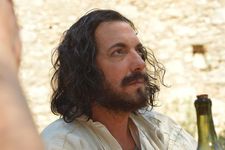 |
| "Cézanne is not weak! You can say anything about him but not weak." |
GG: "I'm sterile" … No, no. I'm saying to Zola: "That's how you describe me? Sterile, vulgar, and obscene? It's one thing that you never understood my work and that you hate it and despise it. But in The Masterpiece you actually describe me as vulgar, sterile and weak like that?" Because that is unfair. Cézanne is not weak! You can say anything about him but not weak. Not sterile! Coming from your best friend? Oh well, then it's over.
AKT: Do you now see Cézanne's paintings differently?
GG: Oh god, yes. Totally. Aesthetically, not everything changed, but the whole adventure changed my taste definitely. I look at the work very differently. And I look at others' work differently also.
AKT: Writers and painters? De Maupassant? Renoir?
GG: No, but let's say my sense of esthetics is a bit wider.
Read what Danièle Thompson had to say on creating a portrait of a friendship in Cézanne Et Moi and working with cinematographer Jean-Marie Dreujou.
Cézanne Et Moi opens in thé US on March 31 and in the UK on April 14.





















